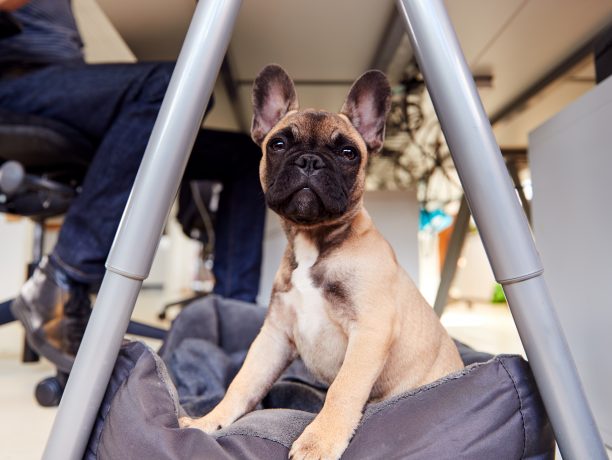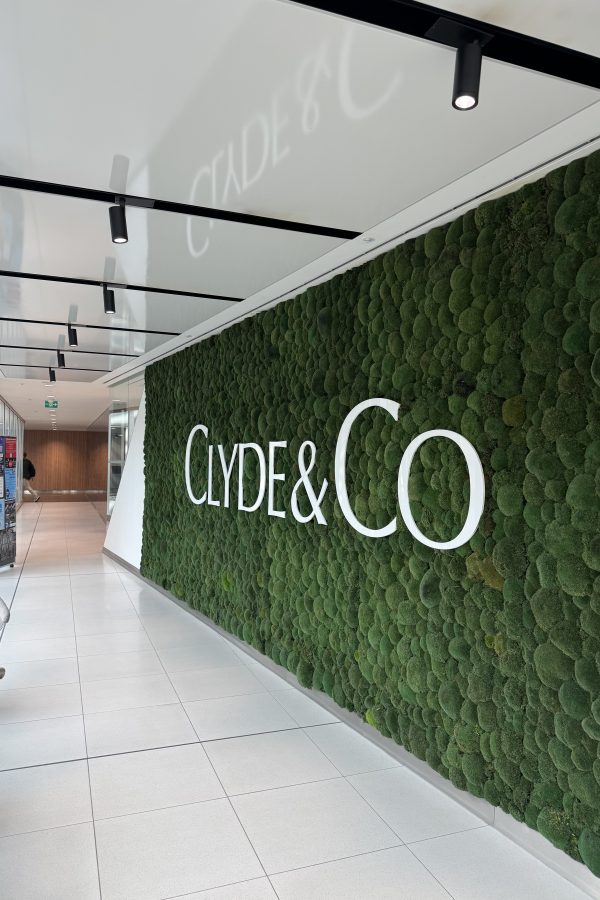The demand for more dog-friendly offices as people contemplate returning to the workplace poses a number of challenges for HR. Are offices ready for a canine invasion, or is it a case of the tail wagging the dog, we ask (and promise that is the only cliche or pun we will use in this article).
Discussions about dog-friendly offices are something of a moot point at the moment, given that there are still relatively few humans in offices. And given that people are increasingly talking about the desirability of having pets in offices, it may be more useful to bring cats to work given their predilection for hunting mice and rats: two animal species that definitely are finding offices friendly at present. Nonetheless, dogs have become increasingly popular during lockdown with previously dogless families acquiring canine followers at an unprecedented rate.
The Pet Food Manufacturers’ Association calculates that about 3.2 million households have become new owners of dogs since the first lockdown in March 2020. The motives for this explosion of pooch love don’t need spelling out at a time when so many people have felt isolated and family members feel the need for other living creatures beyond each other to focus on.
The result of this is seeing fresh demand for offices to open their doors to creatures with four legs (although not the aforementioned rodents).
The benefits
A plethora of research in recent years has extolled the positive benefits of having dogs in offices. The latest, published in April by videoconferencing firm PowWowNow, “reveals” that 45% of home workers would prefer to work in dog-friendly offices. Presumably, the other 55% are not actively opposed but ambivalent. It also claims that women are more likely than men to apply for a job at a company that allows pooches to lounge around with just over half preferring a dog-friendly policy compared with 37% of men.
A perhaps more scientific survey was conducted by the University of Lincoln in 2019 having been commissioned by Nestlé-owned pet food and care company Purina. It claimed to be the first report “to quantify the benefits and the impact of dogs in the office on work-related and dog-related outcomes”. It found that employees who often took their dog to work reported 22% higher satisfaction with working conditions. And any fears that the animals would be a distraction were cast aside with figures showing that employees who took their dog to work reported increased absorption in their work by a significant 33.4% and in their dedication to work by 16.5% – an overall increase in work engagement of 14.4%. In fact, researchers suggested that the presence of a friendly dog may increase motivation and attention to set tasks.
One of the authors, Professor Daniel Mills, wrote: “If you told employers there was a simple way to increase their workforce overall satisfaction with the working conditions, they’d be very keen to learn more. … allowing dogs in the workplace has the potential to improve employees’ focus and probably productivity too. Forward-thinking companies should consider very seriously if they can accommodate dogs in the workplace.”
The potential risks
Purina and Nestlé have been welcoming dogs into offices in Gatwick, Dublin, Sudbury, Wisbech and York for nearly 20 years, but particularly in the past five years. The Gatwick offices have designated lifts for people with dogs and an enclosed outdoor space to let dogs off the lead for exercise. But what of the potential risks? We’ve all witnessed dog confrontations in parks in recent months and many of us do not enjoy dogs rushing up to us whatever their intent.
Priya Hamilton, corporate affairs manager at Purina, is an enthusiast. She hasn’t witnessed any problems with dogs in the office. But then that could be because Purina insists that dogs are assessed by a canine behaviour expert before they are permitted to enter. The company also ensures many areas are kept dog-free. Hamilton says: “People who don’t like dogs can keep away from them. Most of the time the dogs are just asleep under desks.”
The behaviourist checks to make sure dogs don’t whine or bark when their owner leaves the room and they behave with a modicum of decorum around other dogs. The benefits are clear, says Hamilton: “We’ve seen gains around productivity, mental health, and socialising – getting to know other people around the building, people you don’t know. Having a dog is a really nice ice-breaker. There are lots of employee and employer gains,” says Hamilton.
Purina initially found the main obstacles to the dog policy came from people’s allergies and phobias. “For allergies, we sought advice from an external allergy expert and found that pet allergies are the result of contact with a person. We make sure anyone with an allergy does not sit within five metres of a dog and we have dog-free meeting areas, lifts and restaurant so that these people are safe.
The vaccination records of all dogs coming into the office are checked and all animals must be insured.
“Regarding phobias, we have an open dialogue with anyone with phobias – we think we only have one person. There is a ‘wall of fame’ of the dogs when you come into the building which shows where the dogs are sitting so people can avoid them if they wish. Again, we have all the dog-free areas,” says Hamilton.
“Visitors are made aware of the dogs when they enter the building and as staff we are reminded to tell them in the online visitor booking form we use.”
What about different breeds of dogs? It’s easy to imagine a dachshund or pug being fairly unobtrusive but large guard-type breeds such as Alsations and Rottweilers might not be so universally popular; wouldn’t such creatures be somewhat intimidating, especially when owned by a senior manager? “No, we don’t discriminate against breeds. Prior to the dog joining the Pets at Work scheme, our behaviourist will look out for any red flags concerning the dog’s behaviour. And all dogs are always on a lead.”
Purina does harbour reservations about other animal species, however. “Cats are quite particular creatures and can be set in their ways. Dogs love coming into the office and some cats might just not be so keen. The Pets at Work policy is just as much about the dog’s welfare as it is a benefit for employees. We have had no requests for any other weird and wonderfuls … yet.”
The return to the office
Hamilton recognises the attractiveness of a dog-friendly policy in terms of easing people back to the workplace after the Covid crisis eases, particularly those who feel anxious about returning and who may have acquired new pets. “It’s a good employee perk,” she adds.
The company is happy to share its experience with other employers considering a dog-friendly policy and offers advice for employees who want to persuade bosses of the benefits.
Purina/Nestlé’s well researched and mature policy is the result of years of experience. But many firms will be entering into such arrangements for the first time in the coming months and may not own their own office space or have long-term leases. Jonathan Ratcliffe, senior office broker at Offices.co.uk, is witnessing a real trend for dog-friendly office space. “Multi-tenant buildings are often coming under massive pressure on to take dogs,” he says. “Now that lockdown is being relaxed loads of people who own dogs want to bring them to work. I recently spoke to a firm who wants to bring in two dogs into a 20-desk office in Manchester city centre.”
Typically, he says the dogs are “handbag” breeds. “There aren’t many Alsations,” he says, “the dogs just curl up and go to sleep. What you really don’t want and does happen is two dogs in an office barking at each other.”
“Companies are trying to get people back to the office but people are hesitant… what if people can’t leave the dog at home?” says Ratcliffe. “HR will have to come up with a policy. My spaniel wouldn’t just curl up and sleep I’m sure about that! And where are you going to take the dog to go to the toilet in a city centre?”
He adds: “Some bosses are just going ahead and bringing the dogs in and putting pressure on office providers to find dog-friendly offices.”
Ratcliffe sees rented and leased buildings as being more problematic for dog-friendly employers than self-owned buildings. And at the same time as demand for dog-friendly premises has grown, demand for WeWork-style rented offices is up amid uncertainty over space requirements, square foot costs and hybrid working. “Not everyone who manages these spaces will allow dogs to come in,” he says. “First question is ‘what kind of dog is it?’ You need to get it signed off.”
Different strokes for different folks
Rhona Darbyshire, partner and head of the employment at law firm Cripps Pemberton Greenish, would certainly not recommend an ad hoc policy on pets. She cites large companies such as Amazon and Ben & Jerry’s that welcome dogs to their HQs and recognises the wellbeing benefits of having dogs around. But companies will have to work to gain these positives – it’s not just a question of flinging open the doors for man’s best friend.
She says, while resisting the opportunity to use several pet-related puns: “Reduced staff absenteeism and greater productivity are associated with dog-friendly policies. However, businesses should pause for thought before opening their doors to pets and gain an understanding from staff as to whether they think this would aid their working lives. Some staff members may object on the grounds of allergies, potential damage or phobias.
“If Project Pet does embark, businesses should draft a pet policy to ensure hygiene and safety standards are maintained. Businesses should also introduce pets slowly, as the new environment can be overwhelming for the pets. With the health and wellbeing of staff being a focus post pandemic, the possibility of welcoming pets into the workplace could certainly offer a fun solution.”
One Kent-based dog behaviourist who spoke to us is, however, sceptical about this “fun solution”. He says: “I wouldn’t sign a document to say someone’s dog is safe to go to an office because it’s about the owner… I wouldn’t be with the owner in the office”. He adds: “Behaviour trumps breed but it’s also safe to say large guard dog-type breeds would not be suitable.”
Ticketmaster is another company with a dog-friendly policy, with facilities staff taking the lead on checking that the policy is safe for employees and animals. Senior communication director Mel Perrett tells us: “If an employee would like to bring their pooch in they just need to flag it in advance so we don’t have 50 dogs in the office at the same time! Hasn’t been an issue so far – it’s all been very smooth sailing, and everyone just loves having puppies around the office.”
So, however you feel about the onset of puppy love and dog petting in your office on your return to the workplace just remember, it’s very much a case of different strokes for different folks.










